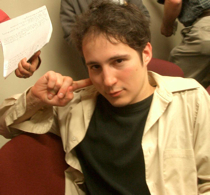Joseph Bisz

Associate Professor
English
EMAIL: jbisz@bmcc.cuny.edu
Office: N-751Q
Office Hours:
Phone: +1 (212) 220-8285
I received my Ph.D. in English Literature and Creative Writing from SUNY Binghamton, and have since sailed my ship in a few different areas of the world, including Creative Writing, Gender and Sexuality Studies, American Realism and the Novel, and Popular Culture (Games and Science-fiction). On the way there I took my hat off to a number of influential writers including Henry James, Thomas Hardy, and Milan Kundera. I’ve published critical work in Reconstruction: Studies in Contemporary Culture, Transformative Works and Cultures, and a few film, food, book and music reviews. My creative writing has happily landed in a dozen journals and anthologies including Diagram. My free time is mostly taken up revising a novel titled World Without End, set on the island of Manhattan in 1982, and continuing my unfathomable odyssey towards all things Victorian.
(If you noticed the water body theme here, you would be a good English major.)
Expertise
Women’s Studies, Victorian Literature, Science Fiction, Psychology of Women, Popular Culture, Human Sexuality, Gender and Sexuality Studies, Games in Education & Games Studies, Creative Writing, American Literature
Degrees
Courses Taught
- English Composition is the standard freshman writing course. The course introduces students to academic writing. By its conclusion, students will be ready for English 201 and for the writing they will be asked to do in advanced courses across the curriculum. Students completing ENG 101 will have mastered the fundamentals of college-level reading and writing, including developing a thesis-driven response to the writing of others and following the basic conventions of citation and documentation. They will have practiced what Mike Rose calls the "habits of mind" necessary for success in college and in the larger world: summarizing, classifying, comparing, contrasting, and analyzing. Students will be introduced to basic research methods and MLA documentation and complete a research project. Students are required to take a departmental final exam that requires the composition of a 500 word, thesis-driven essay in conversation with two designated texts.
Prerequisite: Pass the CAT-R and CAT-W or Accuplacer tests
Course Syllabus - This is a course that builds upon skills introduced in English 101. In this course, literature is the field for the development of critical reading, critical thinking, independent research, and writing skills. Students are introduced to literary criticisms and acquire basic knowledge necessary for the analysis of texts (including literary terms and some literary theory); they gain proficiency in library and internet research; and they hone their skills as readers and writers. Assignments move from close readings of literary texts in a variety of genres to analyses that introduce literary terms and broader contexts, culminating in an independent, documented, thesis-driven research paper. By the conclusion of English 201, students will be prepared for the analytical and research-based writing required in upper-level courses across the curriculum; they will also be prepared for advanced courses in literature.
Prerequisite: ENG 101
Course Syllabus - The objective of this course is to sharpen students' creative writing skills in the genres of the short story, poetry and drama, depending on students' interests and ability.
Pre-Requisite: ENG121 or ENG201
Course Syllabus - This course examines how science fiction literature envisions the impact of machine technology on the individual and society. The human/machine interaction will be traced from early myths to contemporary science fiction, including works by Asimov, Clarke, Delaney, Gibson, Lem, Orwell, Vonnegut and Zelazny.
Course Syllabus - This course focuses on the gradual emergence of the American novel both as a literary form and as a reflection and reinforcement of patterns in the fabric of American life. Representative authors may include Hawthorne, Melville and Stowe from the 19th century; Lewis, Cather, Fitzgerald, Faulkner, Hemingway and Steinbeck from the 1920's to the 1950's; and Wright and Mailer of the 1960's and 1970's.
Course Syllabus

